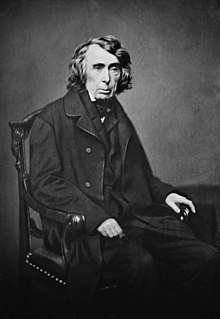Benjamin Chew Howard
Benjamin Chew Howard (November 5, 1791 – March 6, 1872)[1] was an American congressman and the fifth reporter of decisions of the United States Supreme Court, serving from 1843 to 1861.
| Benjamin Chew Howard | |
|---|---|
 portrait by Henry Inman | |
| Born | 5 November 1791 Baltimore County |
| Died | 6 March 1872 Baltimore |
| Alma mater | |
| Occupation | Politician, lawyer |
| Spouse(s) | Jane Gilmor Howard |
| Parent(s) |
|
| Family | George Howard |
| Position held | United States representative, member of the Maryland House of Delegates |
Early life and education
Howard was born at Belvidere in Baltimore County, Maryland, the son of John Eager Howard and Margaret ("Peggy") Chew, daughter of Benjamin Chew. He received an A.B. from Princeton University in 1809.[2] In 1812 he attended and graduated from Litchfield Law School in Connecticut.[3] During 1814, the last year of the War of 1812 he served as a Captain in the First Mechanical Volunteers at the Battle of North Point. He remained in the service and later he reached the rank of brigadier general in the Maryland militia.[2]
Marriage and family
.jpg)
Among his siblings were George Howard, Governor of Maryland; Dr. William Howard, a civil engineer and architect; and Charles who with his son Francis Key Howard, were imprisoned in Fort McHenry at the start of the American Civil War. In 1818 he married Jane Gilmor who would write a charity cookbook and after the Civil War lead a successful fundraising fair. They had twelve children.[4]
Political life
A Democrat, he served on the city council of Baltimore in 1820 and both houses of the Maryland legislature. He was elected to the Twenty-first and Twenty-second United States Congress, serving from March 4, 1829 to March 3, 1833. In 1835, President Andrew Jackson named Richard Rush and Howard to arbitrate the Ohio-Michigan boundary dispute.[1]
He returned to Congress in the Twenty-fourth Congress and was re-elected to the Twenty-fifth, serving from March 4, 1835, to March 3, 1839. During this service, he chaired the House Foreign Relations Committee for four years. He was the Reporter for the U.S. Supreme Court in 1843-1861.[1]
In 1861, he was one of the emissaries sent by President James Buchanan to try to secure a peace with the Confederacy. That year he unsuccessfully ran for Governor of Maryland. He died in Baltimore at his home on March 6, 1872 and is buried in Greenmount Cemetery.[1]
See also
References
- "Biographical Directory of the United States Congress". Retrieved 25 January 2019.
- "Scharf, John Thomas. The Chronicles of Baltimore: Being a Complete History of "Baltimore Town" and Baltimore City. Baltimore: Turnbull Brothers, 1874". Retrieved 25 January 2019.
- "Litchfield Historical Society. Database of Students of the Litchfield Law School". Retrieved 25 January 2019.
- ""Fifty Years in a Maryland Kitchen"...and Belvidere". Researching Food History. Retrieved 25 January 2019.
External links
- Works by Benjamin Chew Howard at Project Gutenberg
- Works by or about Benjamin Chew Howard at Internet Archive
- Benjamin Chew Howard at Find a Grave
| U.S. House of Representatives | ||
|---|---|---|
| Preceded by John Barney and Peter Little |
Member of the U.S. House of Representatives from Maryland's 5th congressional district 1829–1833 |
Succeeded by Isaac McKim |
| Preceded by James P. Heath |
Member of the U.S. House of Representatives from Maryland's 4th congressional district 1835–1839 |
Succeeded by James Carroll and Solomon Hillen |
| Legal offices | ||
| Preceded by Richard Peters |
United States Supreme Court Reporter of Decisions 1843–1861 |
Succeeded by Jeremiah S. Black |

